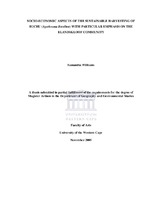| dc.description.abstract | The aim of this thesis is to explore the socio-economic factors that impact on the sustainable harvesting of buchu in the Western Cape of South Africa. Some of the factors that will be explored include poverty, natural resource tenure, legislation, and local practices with regard to the harvesting of buchu. In order to achieve the objectives of the study, which include documenting different local livelihoods, establishing the roles played by the harvesting of wild buchu within these livelihoods, and analyzing perceptions of different stakeholders regarding sustainable harvesting of buchu, the study employed two approaches. The first was a review of the literature, and the second, empirical research in the form of a case study (the communal land owners of Elandskloof, Western Cape) was utilized. Agathosma betulina, one type of buchu and cited as the best type of buchu, has gained popularity as there is a demand for plant material both locally and internationally. This demand has created some concerns for wild populations of buchu as much of the industry is still supplied by populations harvested from the wild. Cultivation of buchu has emerged as a possible pressure lifter to the wild populations, as a poverty reduction strategy (as rural people are also cultivating), and as a way to provide for some of the demand experienced in the market. The buchu industry is a very lucrative one and, therefore, many problems are being identified and experienced. Noting this, the study makes two broad arguments. Firstly, even though the buchu trade is dynamic and fraught with many difficulties, it is a trade that can benefit all stakeholders and, consequently, there is a need for new legislation or a review of the current legislation guiding the industry. Better monitoring and evaluating processes, as well as information and communication platforms where stakeholders can interact, prove important. Hence, this should include the participation from stakeholders at all levels. Secondly, in order to establish effective policy guidelines, an understanding of the social dynamics that influences buchu harvesting is important for the resource sustainability as well as the trade. | en_US |

